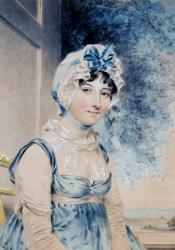Maria Edgeworth and Feminism
Maria Edgeworth was an excellent example of feminism in literature and bringing patriarchal issues to light in the Romantic Era. With her publication of Letters for Literary Ladies, this really pushed her into the ring of feminism in literature. While we've seen feminism through Mary Wollstonecraft, the feminism that Edgeworth promotes is different and encourages a domestic form of freedom for women. She believed in becoming a better woman and fighting for your rights through self-understanding rather than fighting others for it. Edgeworth also believes in educating women to better themselves and understand the world. There's a line that Edgeworth's work likes to walk between for women's individuality and domesticity.
Edgeworth was a powerful advocate for educating boys and girls equally, marrying someone who ‘suits her in character, temper and understanding’ and the importance of self-individuality. Her work is seen by many as incredibly successful, especially as time has gone on. While it’s not as popular today as it was back then, we still find Maria a strong contender for feminism.
We can also look at her father, Richard Lovell Edgeworth, who was a supportive friend alongside her through her journey. As an inventor and author with high credibility at the time, he seriously encouraged her writing and prompted women’s rights. They worked together to publish and edit her works, always working to improve them.
Edgeworth’s pieces are seen as morally and socially dynamic, really upholding the educator’s role when it comes to fiction. She wrote many interesting pieces, along with follow-ups for certain events. While writing The Absentee, Edgeworth had left an anti-Semitic remark, which was quickly rebuked by Rachel Mordecai, an American Jewish woman. Edgeworth quickly went on to write Harrington, an apology to the Jewish people.
Between 1800 and 1814, Edgeworth was incredibly successful in her writing and was celebrated as a novelist. We look back and are grateful for her contribution to feminist fiction and the influencing media of women’s rights in the romantic era.

